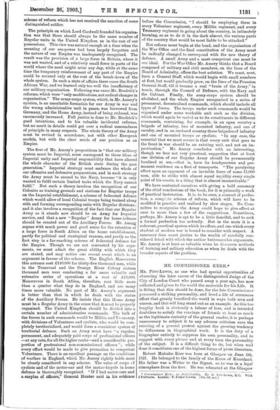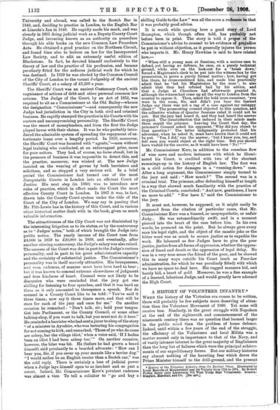MR. COMMISSIONER KERR.* Ma. PITT-Lawn, as one who had special
opportunities of observing the later career of the distinguished Judge of the City of London Court who passed away a year ago, has now collected and given to the world the materials for his Life. It is fitting that this should be done, for the late Commissioner possessed a striking personality, and lived a life of strenuous effort that greatly benefited the world in ways both seen and unseen, and that will long stand out as an example. As this too lengthy book is obviously a labour of love, and is intended doubtless to satisfy the cravings of friends at least as much as the legitimate curiosity of the general reader, it is perhaps unnecessary to subject it to any adverse criticism save the entering of a general protest against the growing tendency to diffuseness in biographical work. It is the duty of a biographer entirely to suppress his own personality, and to suggest with every phrase and at every turn the personality of the subject. It is a difficult thing to do, but when well done it constitutes one of the highest forms of prose literature.
Robert Malcolm Kerr was born at Glasgow on June 5th, 1821. He belonged to the family of the Kerrs of Kerrsland. His father was a Writer to the Signet, so he was in a legal atmosphere from the first. He was educated at the Glasgow
• Commissioner Serf: an individuality. By G. Pitt-Lewis, KC. With 2 Portraits, London ; T. FisherIInwin. 10s. lid. University and abroad, was called to the Scotch Bar in 1843, and, deciding to practise in London, to the English Bar at. Lincoln's Inn in 1848. He rapidly made his mark, and was already in 1851 doing judicial work as a Deputy County Court Judge, and becoming known as an authority on procedure through his able books on the new. Common Law Procedure Acts. He obtained a good practice on the Northern Circuit, and found time also to lecture on law for the Incorporated Law Society, and to edit an extremely useful edition of Blackstone. In fact, he devoted himself exclusively to the theory of law and the practice of his profession, and became peculiarly fitted for the arduous judicial work for which he was destined. In 1859 he was elected by the Common Council of the City of London to the vacant Judgeship of the ancient Sheriffs' Court, at a. salary of £1,200 a year.
The Sheriffs' Court was an ancient Customary Court, with cognisance of actions of debt and other personal common law actions. The Judge of the Court, by an Act of 1852, was required to sit as a Commissioner at the Old Bailey—whence the designation " Commissioner "—and consequently the new Judge had jurisdiction in the City in both civil and criminal business. He rapidly stamped the practice in his Courts with his austere and uncompromising personality. The Sheriffs' Court was the resort of moneylenders, and from the first the Judge played havoc with their claims. It was he who probably intro- duced the admirable system of spreading the repayment of ex- tortionate loans over a lengthy period. In 1859, moreover, the Sheriffs' Court was haunted with " agents,"—men without legal training who conducted, at an extravagant price, cases for poor suitors. They had, of course, no locus standi, but in the pressure of business it was impossible to detect this, and the practice, moreover, was winked at. The new Judge insisted on the wearing of gowns by both barristers and solicitors, and so stopped a very serious eviL In a brief period the Commissioner had turned one of the most disreputable Courts in London into an efficient Court of Justice. His next step (in 1860) was to introduce new rules of practice, which in effect made the Court the most effective County Court in London. In 1867 it was, in fact, drawn into the County Court system under the title of the Court of the City of London. We may say in passing that Mr. Pitt-Lewis has in the history of this Court, and in various other historical matter dealt with in the book, given us much valuable information.
The attractiveness of the City Court was not diminished by the interesting litigation as to its status, or by the controversy as to " Judges' notes," both of which brought the Judge into public notice. The yearly income of the Court rose from £4,000 in 1859 to £20,000 in 1899, and eventually, after another stirring controversy, the Judge's salary was also raised. The success of the Court was due in part to the Judge's curious personality, and in part to his great administrative capacity and the certainty of substantial justice. The Commissioner's personality was in itself scarcely attractive. His brusqueness, and even rudeness, of manner must have been hard to bear ; but it was known to conceal extreme shrewdness of judgment and true kindness of heart. Counsel were not likely to be discursive who were reminded that the jury got one shilling for listening to four speeches, and that it was bard on them as it only amounted to threepence a speech. Nor do counsel in a County Court like to be told : " You've said it three times; now say it three times more, and that will be once for each of the jury and once for me." On another occasion he remarked : "Don't talk, sir; hold your tongue. Get into Parliament, or the County Council, or some other talking-shop, if you want to talk, but you must not do it here." He reminded a barrister whohad sent a juror to sleep of the story " of a minister in Ayrshire, who was lecturing his congregation for not coming to kirk, and remarked, Those of ye who do come are asleep, bar the village idiot,' when a voice said, 'If I hadna been an idiot I had been asleep too." On another occasion, however, the biter was bit. He (before he had grown a beard himself) said petulantly to a bearded advocate: " How can I hear you, Sir, if you cover up your muzzle like a terrier dog." " I would rather be an English terrier than a Scotch cur," was the cold reply. There is certainly a loss of judicial power when a Judge lays himself open to so insolent and so just a retort. Indeed, Mr. Commissioner Kerr's petulant rudeness was almost a vice. To tell a solicitor to "go and buy a shilling Guide to the Law" was all the more a rudeness in that it was probably good advice.
It is worth while quoting here a good story of Lord Brampton, which though often told, has probably not before been in print. The story is told d propos of the Commissioner's advice to counsel to let evidence of prejudice be put in without objection, as it generally injures the person who imports it. Mr. Henry Hawkins is said to have related how,— "When still a young man at Sessions, with a serious case to defend, yet having no defence, he once, on a purely technical ground, while ever on the look-out for a break down,' forced a Magistrate's clerk to be put into the witness-box by the prosecution, to prove a purely formal matter ; how, having got him there, he cross-examined him, and made him practically admit that he 'led his Magistrates by the nose '; to also admit that they had refused bail by his advice, and that a Judge at Chambers had afterwards granted it, although the witness had come up all the way to London from the country to oppose it. Then, asked the bold cross-examiner, you were in the room, Sir, and didn't you hear the learned Judge say there was not a rag of a case against my unhappy client ?' The prosecuting counsel objected to this question, and the collective wisdom of Quarter Sessions ruled it could not be put. But the jury had heard it, and they had heard the answer stopped. The dissatisfaction this induced in their minds made them acquit the prisoner. Leaving the Court that day, the prisoner's Counsel asked his opponent, Why did you object to that question ? ' The latter indignantly protested that his adversary, when he asked it, must have known that it could not be put. Yes, I did,' was the answer; but I knew you, too, and felt sure you would object at the right time. But you should have waited for the answer, as it would have been " No '" Mr. Commissioner Kerr, in addition to the ceaseless flow of wise saws and modern instances with which he illumi- nated his Court, is credited with two of the shortest summings-up in the history of English law. The first was in a civil action for damages in a " running-down " case. After a long argument, the Commissioner simply turned to
the jury and said : " Hew much " The second was in a criminal trial. The prisoner, after defending himself at length in a way that showed much familiarity with the practice of the Criminal Courts, concluded: " And now, gentlemen, I have no more to add." " Nor have I," said the Commissioner to the jury.
It must not, however, be supposed, as it might easily be supposed from the citation of particular cases, that Mr. Commissioner Kerr was a biassed, or unsympathetic, or unfair Judge. He was extraordinarily swift, and in a moment pierced into the heart of the case before him. In his own words, he pounced on the point. But he always gave every man his legal right, and the object of the caustic joke or the bitter word was as much to secure justice as to expedite the work. He laboured as few Judges have to give the poor justice, justice from all forms of oppression, whether the oppres- sion of fraud and deceit or the oppression of legal delay. He was in a very true sense the friend of the poor, and he showed this in many ways outside his Court (such as Poor-law administration, for which he was peculiarly fitted) with which we have no space to deal here. His rugged manners hid, and barely hid, a heart of gold. Moreover, he was a fine example of a learned, laborious Judge, and would greatly have adorned the High Court.







































 Previous page
Previous page